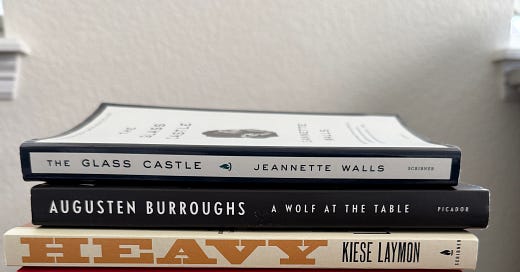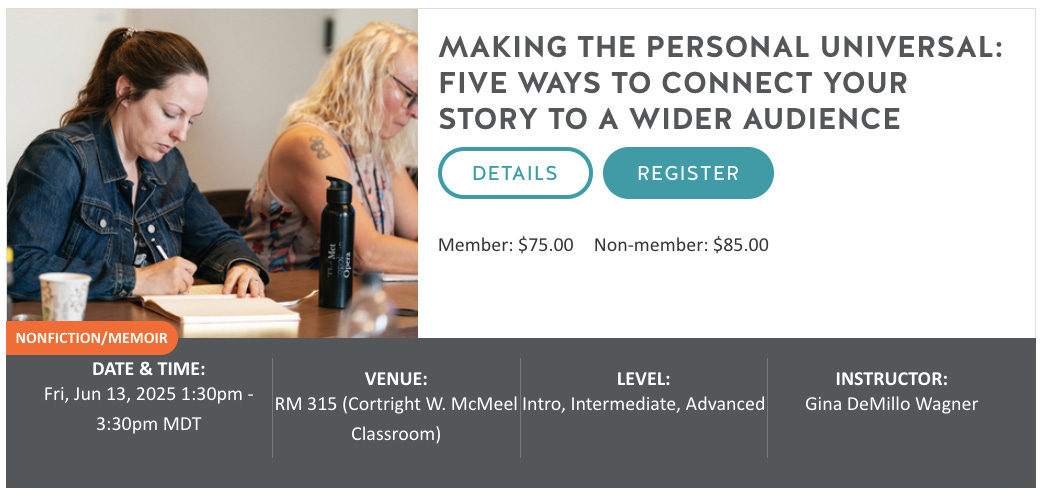The books that helped me write my book
and some opportunities for us to connect in person this May and June
I’ve been writing a lot lately. Which means I’ve been reading a lot. The two are inseparable. There is no writing without reading.
The reading I do while I’m writing is different than normal reading. Instead of reading one book start-to-finish, I read several books at a time. I have little stacks all over the house. A few by the desk in my office. Several on my nightstand. One book in my purse. One in my car.
Many of these books I’ve read before. I pick them up and skim a few pages when I want to be reminded of how I felt reading them for the first time. I pick them up when I want to remember how a particular author achieved their goal, how they handled a tricky section of dialogue, or how they moved a story through space and time. Sometimes I read a chapter backward to see how the story unravels.
The books are inspiring, yes, but more than that, it feels like they’re giving me an emotional boost, cheering me on from every corner of my life. It’s like I need to fill my head with words until it overflows. The process jumpstarts my creative engine, opens new channels for my story to flow through.
I was tidying up my stacks of books recently and saw several of the titles that I reached for while writing my memoir. I thought you might like to see them. Some of these books I read years ago, some more recently. All were (are!) influential, inspiring, permission-giving, provocative, soothing, validating:
from bottom to top:
Know My Name, by Chanel Miller: I feel like this should be required reading. It’s about a sexual assault, but more than that, the systems that protect perpetrators, the nonlinear process of healing from any bodily harm, and the beauty that emerges once survivors are given a voice.
The Rules of Inheritance, by Claire Bidwell Smith: Claire is a friend of mine, a grief expert, and one of the first people to cheer me on as I started my manuscript. I love the way she approaches scenes in her memoir, how she brings her dead parents to life by writing about them in present tense, and the compassion she finds for her younger self.
Peace Like a River, by Leif Enger: I’ve re-read this novel at least three, four times? There’s so much to say about it. But what I kept coming back to is the way Enger engages landscapes and nature as their own characters in the family’s saga.
How to Write an Autobiographical Novel, by Alexander Chee: I was fortunate to be a student of Alex’s in 2019, at a time when I was burned out and unsure whether my manuscript was worth finishing. He read the first few chapters and told me I absolutely had to keep going. This book of his is an essay collection, not a how-to guide, though you will learn a lot about yourself if you read it.
Heavy, by Kiese Laymon: Another book that I believe should be required reading. It’s about so many things: The South, race, gender, addiction, mothers and sons, and all the ways our secrets show up in our bodies and are handed down through generations.
A Wolf at the Table, by Augusten Burroughs: This is a prequel to Running With Scissors, and apart from it being a tense and compelling story, it made me consider all the ways a parent can show up either as a shadow of themself or as a villain in our story — and yet, as kids, we still ache for them.
The Glass Castle, Jeanette Walls: An oldie but goodie. This book taught me how to tell a traumatic story from a place of agency and empowerment. I appreciated the way Walls vividly captured her family’s chaos, dysfunction, and neglect in a matter-of-fact tone.
Not pictured (I either loaned these out or misplaced them?! I may have to buy another copy so that they can all be together again.)
Fun Home, by Alison Bechdel: In this graphic memoir, Bechdel details her complicated relationship with her family, especially her father, who ran a funeral home. When he died, she was left with unanswerable questions about him, about sexuality, and the ways he hid from his daughter in plain sight.
Educated, by Tara Westover: Lessons in estrangement, abuse, and how dysfunction can feel normal when you don’t know anything different. And how it’s possible to break free and forge your own path, but you can never go home again.
Memorial Drive, by Natasha Trethewey: Trethewey is a poet, and it’s evident in her memoir. The way she captures the fractured, recursive nature of memory and the unthought known is stunning. I could read this book a thousand times. It’s set in Atlanta, so the landscape felt familiar and soothing too.
What about you? Writer or not, do you have books do you find yourself returning to for comfort or inspiration? Or books that you’ll always associate with certain times in your life? Tell me:
Upcoming Events: I’d love to see you!
If you live in Colorado, come check out Erie’s new independent bookstore, Briggs Street Books & Music. I’m leading a free workshop there on Tuesday May 6th from 6:00-7:30 PM. It’s designed for everyone (writers and non-writers) who wants to be more creative and learn how to confront a blank page with more confidence. You can RSVP here.
Lighthouse Writers Workshop | Lit Fest June 6-13, 2025: I’m teaching two classes at Lit Fest this year. The first one is an encore of the class I taught last year that sold out. This year they’re giving me a bigger classroom so more people can attend! Learn more and register on the Lighthouse Website.








Know My Name is such a masterpiece. Just incredible.
On the other hand, I could not get into Heavy. I really wanted to like it but it left me feeling meh.